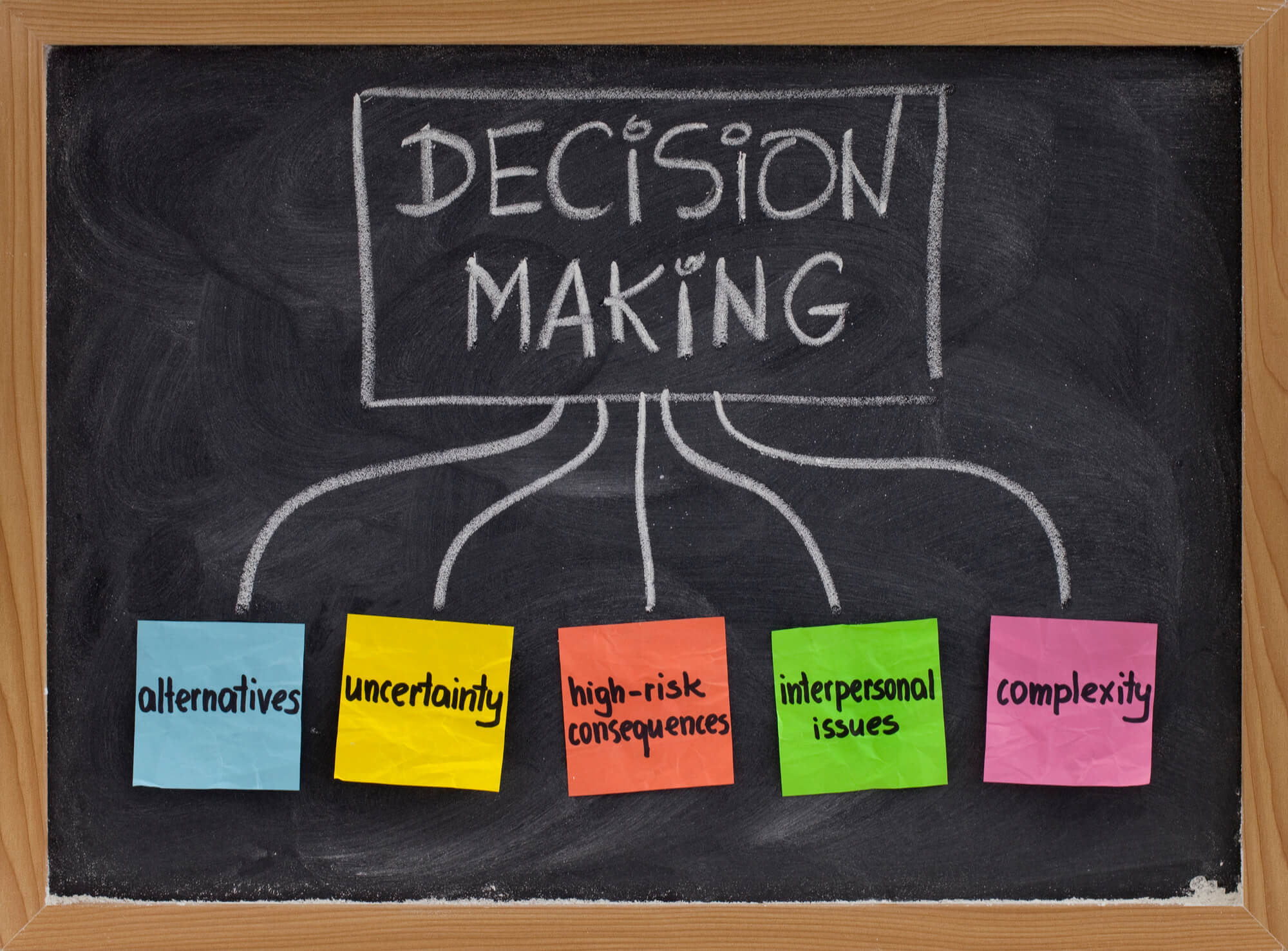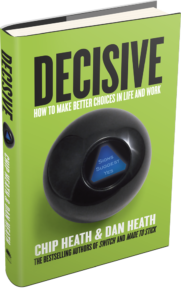Life is a journey filled with endless decision making.
Decisions about career, relationships, finances, health, home, family, children, shifting jobs, managing conflicts,
Decisions on taking up that challenging role, hiring new talent, letting go of people, starting on your own, putting together a team, exiting the business, retirement planning, the list goes on.
In my role as an Executive Coach, I am privy to the struggles my Clients face with decision making and the conflicts thereof.
What is Decision Making?
At the heart of all decision making lies a choice
Decision Making is essentially choosing to go with one line of thought or action, or picking one way to address a problem over the other.
Collecting data, examining facts, looking at trends, studying predictive models, conducting research etc. are some approaches to critical decision-making.
Intuition plays a role too either on its own or in combination with the methods as mentioned above.
Decision Making Done Right

An ideal combination of sound decision making would be deep experience plus strong intuition backed by reasonable amounts of data.
Decision – making is effective when it moves from concept to actual implementation, with optimal use of time, energy and resources, and brings the expected outcomes.
Simply put, when your decisions lead to desired outcomes.
I want you to reflect and think about the decisions you have made just this month.
How did you arrive at them? Did you deliberate or make them on impulse?
Were you calm, excited or nervous while making those decisions?
Did you give yourself sufficient time and effort in arriving at that decision?
And, most importantly, what was the outcome?
Decisions Reversed
Human decision – making is complex. On our own, our tendency to yield to short-term temptations, and even to addictions, may be too strong for our rational, long-term planning.
~ Peter Singer
Human beings are irrational creatures
Just like everyone else you might have made decisions too that have caused you to regret later, either because it did not bring you the desired outcome or maybe it caused you more trouble than before. In hindsight, perhaps you did not put in sufficient thought and rigour into arriving at that decision, well you are not alone.

Look at these statistics.
About 61,535 tattoos get changed within one year, 88% of new year resolutions don’t get met, 44% of lawyers recommend not pursuing a career in law,
40% of senior-level hires find themselves pushed out, failing or quitting within18 months, 83% of Mergers & Acquisitions were unable to create any value for shareholders, 60% of 2207 executives reported that the wrong decision is as frequent as good ones.
These are statistics from the book ‘Decisive’ written by Chip and Dan Heath in 2013.
I would hazard a guess and say, not much would have changed even now.
People continue to make decisions that they wish they hadn’t; My intent for this blog is to help you learn how to improve your decision-making abilities.
Decisions Have Consequences

Every hour of every day, you are making choices, and those choices then become decisions, while some are important, most are inconsequential and are made based on habitual behaviour.
The consequence of making crucial decisions based on habits is that you are likely to encounter the same outcome as before while expecting something different.
Working with a Coach is one way for you to get clear on what conscious decision making looks like and how you can build that skill.
Decisions lead to actions and they, in turn, bring you specific outcomes
Making effective decisions can influence the quality of your work and life.
Read on to understand more about roadblocks to decision making and the ten easy steps you can follow to improve your decision-making.
Potential Roadblocks to Effective Decision Making
Your Mindset
Are you approaching your decisions from a calm state of mind or while being emotionally charged? The latter is likely to colour your views and distort your thinking.
Lack of Information
Do you have all of the information you need to make the right decision, or are you jumping to conclusions with what little you know?
Overwhelm
Are overwhelmed by all the information in front of you? Does it make you nervous, fearful?

Complex Layers
Are there too many people involved in the decision-making process? Is navigating the layers causing you fatigue?
Emotional Attachment
Are you emotionally attached to the decision? Has one become your favourite? Is your ego interfering with your thinking?
Inherent Bias
Do you hold any underlying belief or assumption that might prevent you from making an objective decision? What preconceived notions could you identify and let go?
Inadequate Support
Do you feel that your team may not help you with the follow-through? Are you afraid that you may not have the backing of the firm? Are there any other fears holding you back?
Lack of Clarity
Do you need more clarity on who owns this decision? Are you carrying someone else’s burden? Get clear before you proceed.
Adequate Time
Do you feel rushed into a quick decision? Will haste here actually make waste?
Become aware and attend to potential roadblocks, so you are well prepared to take those crucial decisions.
Let us now look at the ten easy ways you can improve your decision making.
1.Describe the challenge: What is the problem or project that needs addressing? How is making a change going to affect all concerned? Spend time getting clear; clarity has power and will help you move faster onto the next steps.
2.Gather information: What information do you need to make an informed decision? Start by collecting data and facts. Discard anything that isn’t necessary. Meet with team members, ask for opinions from those who matter, cover all angles.
3.Define the expectations: What are the expectations from you? Who are the stakeholders? What are the implications of this decision?
4.Get clear on the timeline: When does the decision have to be made? How much time do you have? Knowing this will help you plan effectively.
5.Ideate on options: Are there other courses of action? Is doing nothing one of them? Write down alternatives, explore the field of possibilities.
6.Weigh the evidence: Does one option stand out above the others in terms of feasibility and outcome? Determine this by organizing your information and then compare the pros and cons.
7.Evaluate the risks: What is at stake? Make sure that you consider whether the payoff of each decision is worth the risk involved.
8.Make a choice: Are you ready to commit? Have you have reviewed everything you can to make a confident decision?
9.Take action: What is the plan, and when does it need to be rolled out?
It’s time to map out your step-by-step plan and implement it. Include specific goals and timelines.
10.Review the outcome: How did it work? Don’t skip this step. Even if your plan has not yet come into fruition, review your decision-making process to evaluate its efficacy, note down your learnings, fine-tune where necessary and repeat best practices.
Following these ten easy steps will help you be systematic in making your critical decisions and thereby increase your chances of success.
In addition to these ten steps, you may also find it helpful to read about the WRAP framework created and explained in the book Decisive by authors Chip Heath and Dan Heath.

Effective decision -making is a skill that will help you grow your career, enhance your leadership and bring you fulfilling outcomes.
While on the topic of growing your career, you may want to read my earlier blog on building powerful habits for a successful career.
I wish you the very best in your pursuit of effective decision making.
Points to ponder :
- What is an important decision you need to make soon?
- How do you feel about making this decision?
- What can help you make this decision better?
Recommended reading
- Decisive by Chip and Dan Heath
- The Art of Decision Making by Tim Castle


 How to manage conflict better and reduce your stress
How to manage conflict better and reduce your stress
Leave a Reply